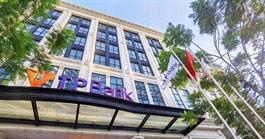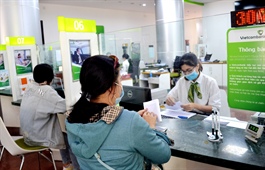A well-functioning NPL market key to a healthy banking sector
A well-functioning NPL market key to a healthy banking sector
Improving the non-performing loan (NPL) resolution framework is a high priority for the banking sector to ensure efficient and effective bad debt resolution, as forecasters predict bad debts will rise post-pandemic.

To cope with the current COVID-19 crisis, Vietnamese banks have been implementing loan forbearance measures over the past two years to help businesses weather the storm.
Alongside temporary payment relief, the State Bank of Viet Nam (SBV) has also relaxed regulations regarding bad-loan provisioning and the classification of loans as non-performing. While these crisis responsive solutions are necessary to maintain business operations, it may cover potential vulnerabilities and non-performing loan ratios are expected to increase, imposing risks on financial institutions’ safety and efficiency once the extraordinary relief measures are withdrawn.
Improvements in NPL resolution framework is seen as an urgent task as the current regulation on secured collateral resolution, Resolution 42, will expire in less than a year after a pilot five-year implementation period.
Strengthening the legal framework for NPL resolution is very timely and important for Viet Nam, especially in the context of COVID-19, Nguyen Kim Anh, SBV Deputy Governor told a workshop on Thursday.
We welcome perspectives from international organisations and the private sector to continue improving the NPL resolution practices, mitigating increasing credit risk and potential material negative consequences, Anh said.
The SBV is reviewing the Resolution 42 and working towards strengthening the legal framework for NPL resolution.
The workshop was attended by around 100 Vietnamese policymakers as well as international and domestic experts, including private sector representatives, to exchange cross-country experiences on the recognition, management and resolution of NPLs.
Kim See Lim, IFC Regional Director for East Asia and the Pacific said: “We appreciate the opportunity to share best practices and lessons from our experience in NPL resolution framework and private sector participation in developing the NPL market.
"We know from past crises that strong preparation and timely action are key in preventing the accumulation of NPLs and consequently, in aiding the resilient recovery from the pandemic, strengthening the banking sector to ensure efficient and effective allocation of capital for continued economic growth and job creation.”
According to Vietnam Banking Association, as of August 31, 2021, the total amount of NPLs classified by Resolution 42 in the banking system was VND424.1 trillion (US$18.4 billion), 70 per cent of which was resolved. On average, about VND7.15 trillion was resolved a month, more than doubling the monthly resolved amount in the period 2012-17. This has kept the NPL rate in the banking sector stably less than 3 per cent between 2016-20.
However, businesses impacted by COVID-19 are unlikely to recover quickly enough to be able to pay back, possibly leading to high increase of NPLs from the third quarter of 2022 when Resolution 42 has expired.
In addition to strengthening the NPL resolution regulations, development of a strong bad debt market, where private investors can buy and restructure distressed assets and help recapitalise the banking system should be a long-term solution to manage the NPLs and ensure a healthy banking sector.
Keith Pogson, a senior expert at NPL resolution from Ernst & Young Asia Pacific, said: “Viet Nam's NPL market is not yet attractive to foreign investors due to the under-developed legal and regulatory framework, unclear and complex process about transferring assets to foreign ownership, inability to take land use rights titles; high risk of certainties because of lack of high-quality information to help make decision and mitigate risks, and the volume of NPLs to be offered to investors not at scale.
“Once a market-based infrastructure for NPL resolution in Viet Nam is in place, foreign investors will enter and NPL resolution will become an industry with many business opportunities for related partners including lawyers, accountants, tax officers, etc.”
The workshop also discussed important legal considerations, including a framework for NPL Resolution, debt enforcement, out of court workouts and insolvency that all contribute to viable market solutions.
Experts from IFC and international distressed asset recovery agencies presented best practices in resolving NPLs in Serbia, Slovenia, Thailand, South Korea and China, and how such lessons could be replicated in Viet Nam. Private sector perspectives on the development of markets for distressed assets, including sales of NPLs to investors were also examined.
“A strong and stable banking system with a solid NPL resolution framework is critical for Viet Nam to continue to grow, promote financial inclusion and build back better after the pandemic," said Kyle Kelhofer, IFC Country Manager for Viet Nam, Cambodia and Lao PDR.
"With its global knowledge and experience in resolving more than $33 billion face value NPLs in emerging markets, IFC will help Viet Nam strengthen its legal framework for NPL resolution, attract more investment in the new market, and continue building a sound and robust financial sector.”





















